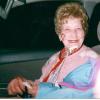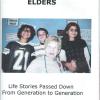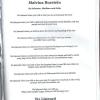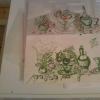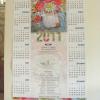MALVINA - 
 photos
photos
Art Resume
Art Gallery
Songs
* * * *
Holocaust
photos from Europe
video interview
newspaper articles & photos
MIRIAM
Art Resume
Art Gallery
Photo Gallery
Book Covers
Extra

Click here to add text.
2 M. Bursteins
my story
1. I was born Malvin Grunfeld, Esther Malka in Hebrew, in the town of Paricov, next to Trebisov, in Austria-Hungary, in what became Czechoslovakia. Today it is Slovakia. In my time, Czechoslovakia was administered in 5 sections, Cesko, Slovensko (where I was born). Morava, Sliezsko and Podkarpadska Rus. When I was 9, our family moved to Trebisov.
2. Trebisov was a town of about 7000 people, mostly farmers and peasants. Among them were 200 Jewish families. We had one synagogue, one rabbi, one shoychet, one cantor, and one cheder. We were all orthodox.
3. The townspeople were Catholics. In my youth, I remember signs, "Jews, Go To Palestine" but we got along in peace and harmony with our neighbors.
4. I was the youngest of 8 children. My family had lived in this region for hundreds of years. There were rabbis in my family. My grandfathers were rabbis. My mother married when she was 15 1/2 years old. Soon after I was born, my father was drafted into the Hungarian army in WWI, and was a prisoner of war for 8 years and so I grew up without my father until he returned when I was 9 years old. My oldest sister, Helen, was married to Bela Weinstein and they had 9 children. My second sister, Sylvia came, alone, to America in 1922. My sister, Lenke, was married to a rabbi, Nusen Elias Grunfeld. My sister, Zali, had a 9 year old boy, Shaul. My brother, Rumi (a nickname for Avruhum), was a yeshiva bocher. He had smicha, rabbinic ordination. My brother Irwin (Izak, or Icu or Yitzchak), luckily came to America in 1939.
5. In 1938, when Germany invaded Czechoslovakia, by surprise at night, they occupied Brno, and my sister, Lenke, and her husband, the rabbi, left everything they had in the middle of the night and came to my mother's house in Trebisov.
6. A few months later, we received a card from my sister, Helen. They had to leave their house in Galanta in 1/2 hour - she and her husband (a cantor and a shoychet) and their children, because they had no citizenship papers, and they were taken to a camp. That was the last time we heard from her.
7. In Trebisov, the first sign of the Nazis in Czechoslovakia was that Jewish stars were put on the Jewish stores that they should be boycotted. There was a curfew for Jews from 5 in the evening til 8 the next day. The Nazis came to our house and searched and looted. If you had 3 pairs of shoes, they took 2 and left you 1. They took clothes, furniture, whatever they wanted.
8. They knew where the Jewish people lived and they came to take the single Jewish boys away. My brother, Rumi, was taken to a labor camp.
9. They came to our house looking for Yitzchak. Three days before, he'd left for Prague, waiting to come to America.
10. Then the Nazis searched for single girls and women. I was hiding in several places in my town, finally, under the porch of my mother's house. One day, I could hear the Nazis above me looking for me.
11. It was Pesach 1942. My family all agreed I wasn't safe and I should leave Czechoslovakia and go to Hungary. You could be Jewish in Hungary. I spoke Hungarian (we spoke in our area Hungarian, Czech, Slovak, German and my mother spoke to us in Yiddish). However, it was illegal in Hungary for anyone to be a refugee. My brother-in-law, the rabbi, put his hands above my head and blessed me. He said, "Now you can do anything to save your life." I left in the night saying goodbye to my mother who was 62 years old, my sister, Zali, and her 9 year old boy, and my sister Lenke and her husband, and Rumi. That was the last time I saw my family. I walked together with a 13 year old boy, 7 miles, all night til we arrived in Hungary. The boy went on his way to Budapest. I stopped at my aunt's home, in Hungary, where they gave me the identification papers of their Jewish maid, Lea Ingel, and I went to Budapest.
12. I found places to stay and work. My profession was hatmaking. I had a small store in Trebisov together with my brother, Yitzchak, who fixed watches. It was his store.
13. Soon the same anti-Jewish laws came to Budapest and you couldn't be Jewish in safety.
14. In Budapest, there were a few Jewish friends I made and we used to meet every week in the park. It wasn't safe to talk more than you had to, however, we met just to be together. They were also refugees from Czechoslovakia. There were two brothers, Tibor Slezak (b. 1916) and Wily Slezak (b. 1921). Tibor also used the names Tibor Salgo, Sanyi Katyi, Darai Sandor and Alexander Karec who was from Yugoslavia. Wily had changed his name to Wily Salgo and also to Laszlo Fejes. And Jan and Gyuri Perl were also in the group.
15. The horrors of the war began against the Jews. And the bombing.
16. The group was meeting in the park. One day, Wily wasn't there. Everyone was worried.
17. In a few weeks, we heard the report that Wily was back. After being caught by Nazis, he was tortured. He managed to escape. Now he was all right but it wouldn't be safe for him to be outside because of the noticeable bruises and he had no proper identification papers.
18. Tibor, his brother, by himself, called the Hungarian Government National Printing Office, claiming to be calling for work papers for the Pantokemia (Pantochemia) Munitions and Button Factory in Budapest. He asked for 500 work papers. He said he was sending someone over to pick up the papers. The government printing office was Nazi run. With my own false identity papers saying I was Gizi Kovacs, I walked over to the Hungarian government printing office.
19. I was given forged papers by Tibor to show them and Wily walked with me and waited 3 blocks away, watching, to see if I would come out.
20. I got the papers. I gave the papers right away to Wily. And I went and got papers 2 more times. I always gave the papers right away to Wily. 1500 Hungarian government identification papers. We do not know today what was printed on those papers. And we do not know who got the papers. We only know 2 people. Wily was one of them.
21. I was in Budapest until the end of the war.
*also worked in Weiss's kosher restaurant on Dob utca in Budapest using the name Amalia.
MALVINA BURSTEIN <> MIRIAM BURSTEIN
(1913-2010)
Welcome.
Please
scroll up and down the pages of this website.
If you have some information about the "1500 papers", please:
HAPPY PURIM !
(just something I found on an audio cassette..,
I had to give a speech and I so I asked her to
give an impromtu speech.)
(What are you washing your hands in?)
You could also use. It's very good. Yogurt. Because the ...
(Why don't you give me, give me a little talk about yogurt?)
Yogurt!
Yogurt was discovered many, many years ago when people didn't know anymore what to do with the milk. And research... according to research, that's the best nutrition what it provides vitamin C, and vitamin B. And if you take that much daily, it makes your face beautiful and healthy. And many people using it only for holidays. Put it out. It's not true. Put it in. So they, he should make a research. Yogurt is one of the best __??__ and it was discovered by a little peasant girl in Scotland.
(How?)
How she discovered? Well, she thought cheese is too heavy. Milk is too light. Light milk. So it's in between cheese and milk. It's not as heavy as cheese and not as light as milk, so people start to enjoy it because it didn't leak too much, and you didn't have to chew. They could just swallow it. Little by little. Without hesitation. Then it become popular where people could use it in everything, in salads, in foods and then it became like a favorite dish all over the American society.
Click above to hear "speech" typed here in green:.
Honoring Our Elders
Malvina spoke occasionaly about her experiences to people and groups of all ages.
^^^ They used Malvina's art for the 2011 Calendar of
the Hebrew-Home!! ^^^^ click photo above to see it! Malvina is on www.Hebrew-Home.org on the "Take
a Virtual Tour of Ring House" -- [photo 18]. (To see the photos I took of her photo there, click on PHOTOS Page .)
Miriam is designing this website, using:
Happy New Year 5776 !
Movie 1989 A Taste of Europe - she speaks like they would speak (7 minutes?)
You show me what I’m doing. You supposed to show?
(M: OK. It’s moving.)
Uh? It’s talks? OOOh! God bless Miriam to the New Years. First time in this house after many years, on Chanuka. I don’t remember when you were here. God should give you Mu-oz Tzir yeshiusi. (Sings the tune and some of the words to Maoz Tzur)
Riboyno shel oylom. God should give you alles gites (everything good). A ___ betshen, mit allen gitten, besires toyves, o, yeshues, v’nechumes, Lieber Got, Ooo-mein (Amen). A good luck, a good health, and a guten chusen (bridegroom)! Ooo-mein.
A gite voch (A good week) (4x), (sung to the tune sung after Shabbos is over), a good chess game (2x), a gite voch, you should win. A gite voch (8x). Oo-oo-mein.
Now. Oh, you not playing? Come play one game. ___one game. __a kushere metzia. You will bekimen a kushere metzia. Fervus nish? Fevus nish? (Why not?) _____. _____ Men miss. Men miss (a person should). Men miss mazel hubn. (A person should have luck.) Men miss. (3x) Why not? Why not you? Mazeldik? Why not you?
Riboyno shel oylom. (Master of the World). Zoll moch une leiben in (not sure about that) mein alter yuren. (I should have life in my old years {?})
A gite, a gite pernuse, __. Thank God, mit naches from di kinder (children). Thank God, mit alle (with all the) grandchildren, mit alle wiseguys and stars and angels from heaven. Haben rachmunes. (Have compassion) He should bless everyone and Miriam should find her life whatever she desires. And
. . . a lach, kinderlach (children).
“A gite numen is mer vert vi gold.” (“A good name is worth more than gold.”)
“Es ist shein tzi huben yiches, but der eigener yiches ist der greste yiches, mein kind.” (“It is nice to have yichus (pedigree in the family), but your own yichus (your own actions) is the best yichus,” my child.)
Zo is dus leiben geit azoy tzi (So that’s how life goes), Bei anderen vil men, takeh (really, emphasis), sheines zein. Bei anderen vil men sheines zein. __? Azoy tzi machen. _____?? (“By others, __ find niceness.)
“Minden szentnek maga felég huza (sp) kezsed.” (Hungarian)
(M: What does that mean?)
“Fer alle (for all the) saint, their hand pulls towards them.” So they still want everything. Even if you are a saint, you still want (for) yourself. Selfish.
Now what can I tell you? Wisdom of life. Wisdom of life, “If you good, you good to yourself” – my mother’s wisdom. That’s the end of the secret of living. You good to yourself, takeh, you good. Don’t blame others. That’s it. You good to yourself. The obligation from a human being, the way we believe in - (like it would be a sermon) - God created . . . What God created? And then He was hiding. He was hiding from the people what He created. He didn’t know what was the answer to that. But He was hiding.
You cannot hide. So. Your eyes are the traitor, right? Your eyes. Rachel married because her eyes were good. Ruchel or Rachel.? What’s true? Who knows? What’s profited by it, it’s true. (If you get value from it, it has value.)
We pray for pernuse (livelihood). We pray for oysher (riches). We pray for richness. And above all we pray for chein (grace) in peoples’ eyes. Chein. Chein. Chein, it’s important. It means you should find compassion in people, and they should find you attractive.
It’s no laughter. The world is created. God made woman. And woman, they didn’t have Elizabeth Arden in those days, but they had flowers, red flowers, and they created lipstick from the red flowers, or they bite their lips, like Rozsika (her cousin), did, until it was red. Then they couldn’t have . . . (blush), so they punched (pinched) their cheeks, they should have red cheeks. Then they used matches, matches? Matches and matches, matches match, matchmakers and matchmakers . . . to open their eyes . . . wider (for eyebrow pencils), so they should look better.
Now what else is there?
God in Heaven was sitting with His servant, and a servant is looking from heaven on the earth and he sees a very pious man. He was very, very educated and very pious.
He said, “God, how can you let it happen? That man is so great and he is marrying that common girl! How can you allow that?” God looks at both on the ground and looks at that servant. “What would I do with the many bad people? (M: If someone didn’t marry them?) Someone has to marry.
So that was the result. Tzadik (a righteous person). You have to be a tzadik. You have to be a tzadik. Tzadik is what? Righteous, pious, tzadik.
But there are many . . . In my village, there was only one Jewish man (she must have heard him referred to as a tzadik when she was there from all the people). He was a tzadik. He was not educated. He was a tzadik. (M: What did he do?) He was just honest, very honest, and very hard worker, and he never hurt anybody. So that’s the end. Now let’s finish for today. Today lecture was great and I would like to win.
Movie for this is not yet here

